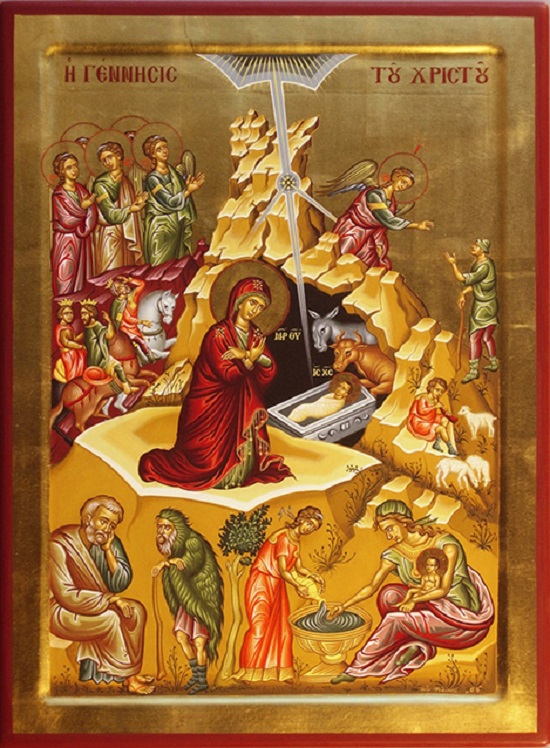Keeping the Night Watch
Christmas Night Scripture Readings

While the story of the Nativity is all about Jesus, the description of the announcement of his birth is all about us. When we contemplate this story, we can’t help but notice what a prominent place the shepherds are given in the narration. This is quite deliberate. Shepherds play a particularly important role in the history of the people of Israel. Many of the most important figures in the story of God’s relationship with humankind were shepherds. The patriarchs, Abraham, Isaac, and Jacob were all shepherds. Moses tended the flocks of his father-in-law, Jethro. As a young man, David was called from pasturing his father Jesse’s sheep when he was anointed king by the Prophet Samuel. The Prophet Amos described himself as a herdsman and a dresser of sycamores. Not only that, but God called men like King Saul to shepherd the people and promised them a Messiah king to be the one shepherd of all the people [Ezechiel 34:23]. Even beyond that, the Hebrew Scriptures call upon God in the Psalms [80:1], saying “Shepherd of Israel, hearken, guide of the flock of Joseph.”
From this background, one might think that, at the time of Jesus’s birth, the role of shepherd might have been considered a noble profession. In fact, it was anything but. Shepherds were notorious for ignoring the precepts of the Law of Moses. Their work was twenty-four-seven, three-sixty-five. They couldn’t afford to observe the strict laws for keeping the Sabbath rest. Nor could they follow all the precepts for ritual purity. What’s more, they were generally rather dirty, unkempt people. Not only that, but they were the working poor of their day. They often lived in lean-tos at the mouths of the caves where they kept their flocks safe from predators at night. Because of their poverty, they were often reduced to stealing what they needed to live. They were, at the time, among the dregs of Israel’s society.
When we think about the shepherds in today’s gospel, we need to keep in mind this extreme dichotomy between the exalted importance of shepherds in the history of Israel and the miserable condition of shepherds in Jesus’s time. Still, it was these people who first came to know of the birth of the Messiah. There’s an inescapable conclusion we need to draw from this: these are the people to whom God reveals himself: the unkempt, the classless, the irreligious, and even the criminal elements of society. We are one of them. We are the shepherds. We are the people to whom God comes.
Look at the appearance of the angel in today’s gospel. It’s only by closer inspection that we get to see how Luke used a scriptural formulary to describe the birth of the Messiah and how that formulary can be applied to us, as well. Time and again, we see this same formulary used. We see it with Abraham and Sarah in the birth of Isaac [Genesis 17:1-22]. We see it also with Manoah and his wife in the birth of Samson [Judges 13:2-25], with Zechariah and Elizabeth in the birth of John the Baptist [Luke 1:5-25], with Mary and Joseph at the Annunciation [Luke 1:26-38], and now here at Jesus’s birth. The seven-step pattern is the same in all of these: a presentation of the parents in an impossible situation, the coming of an angel, the reaction with fear, the message of consolation and encouragement, a prophetic sign, the response, and the departure of the angel.
Now, what about the angel? In our liturgy for the fourth Sunday of Advent, I spoke at some length about how we should consider these divine messengers, the angels. In some of the situations I just described, the angel is identified as Gabriel, meaning the Power of God. The identification is specific and deliberate because, in each case, the parents-to-be find themselves in an impossible situation. For various reasons, each of the wives finds herself unable to conceive an heir, yet the Power of God overcomes the obstacles and creates a future when none seemed possible. The message arrives at a time of fear and hopelessness and brings reassurance not only in the spoken words but also in the events that follow. When was the last time the angel of the Lord appeared to you? You may be surprised at the answer. Can you say that this has never happened to you?
The appearance of the Power of God to the powerless shepherds in the gospel reading brings them the promise of salvation and relief from their desperation in the person of God himself—Yahweh, the Messiah and Lord. Here, God comes not into the holy of holies of the meeting tent pitched in the desert, nor the holy of holies in the grand Temple on Mount Zion, but into the holy of holies and the ark of the covenant appearing as a feed trough in a cave behind a lean-to filled with smelly sheep and their shepherds. Yes, we are those shepherds. Regardless of who we are, God comes to us when we face an impossible future. God provides us with his word of consolation in our fear, and God makes himself present in the fullness of the Power of his love to make our impossible his possible.
This Christmas Eve, when we look at all the impossibilities of our world, we’re invited to reflect not only on the experience of those shepherds two thousand years ago but, more importantly, on those times in our own lives when the angel of the Power of God came to us when our futures seemed impossible and gave us a message not only of hope but of joy, reassuring us that, indeed, God is with us: Immanuel. Wherever faith blossoms into hope and bears fruit in love, then “a savior has been born for you who is Christ and Lord.”
Get articles from H. Les Brown delivered to your email inbox.